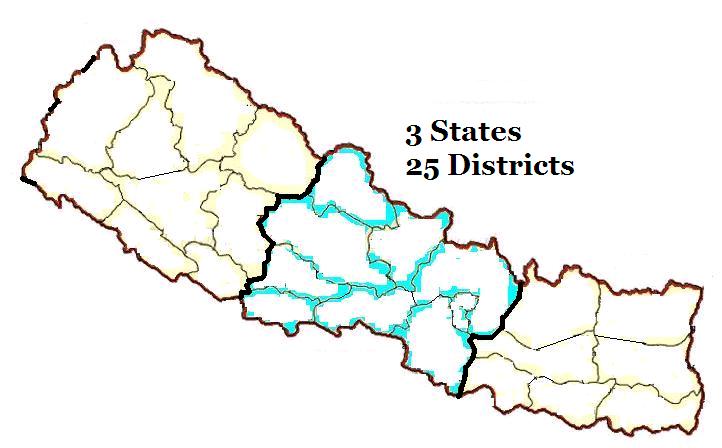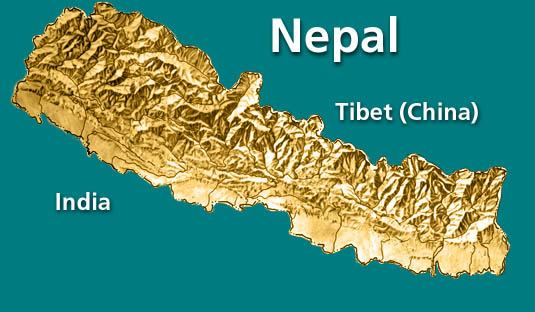

राष्ट्रिय गान
सयौं थूंगा फूलका हामी, एउटै माला नेपाली
सार्वभौम भइ फैलिएका, मेची-महाकाली ।
प्रकृतिका कोटी-कोटी सम्पदाको आंचल
वीरहरुका रगतले, स्वतन्त्र र अटल
ज्ञानभूमि, शान्तिभूमि तराई, पहाड, हिमाल
अखण्ड यो प्यारो हाम्रो मातृभूमि नेपाल ।
अग्रगामी राष्ट्र हाम्रो, जय जय नेपाल ।
New proposed national anthem to be sent to the cabinet for endorsement, Rai is the lucky writer NepalNews
Poet Byakul Maila's song selected as Nepal's new National Anthem Kantipur
National Anthems
NATIONAL ANTHEMS
Lesson Plans - World View: National Anthems Around the World
National anthem - Wikipedia, the free encyclopedia
National Anthems of the World
National Anthems From Around the World PVG Songbook / Teacher's ...
Yahooligans! - Around the World:Countries:United States:National ...
Citizenship Provision In The Constitutions Of The World
Constitution Finder
FindLaw: Legal Subjects: Constitutional Law: Constitutions of the ...
National Constitutions
International Constitutional Law
Constitutions of the World
AdmiNet - World - Constitutions
Constitutions, treaties, and official declarations around the world
In The News
Indian authorities free Maoist leaders Baidya, Gajurel NepalNews
Protect the rights of the journalists: experts
Ceasefire monitoring committee dissolved
Martin calls for prompt and effective response of UNSC to Nepal
Nepal 's Future Socio-economic Agenda
Prachanda’s Southern Sojourn
Over 40 injured in NSU-ANNISR (R) clash at Public Youth Campus
SC issues show-cause notice over airfare hike
New national anthem ready
Negotiators to continue with consultations over interim constitution
Petition filed against Citizenship Act Advocate Amita Shrestha has filed the writ petition stating that the act is against the 1990 Constitution. .... argued in her writ that the Act does not have the power to rescind Article 8, 9 and 10 of the Constitution. .... The petitioner has asked the apex court to revoke the Citizenship Act 2006 claiming that it has been introduced with malafide intention.
Government defends appointment of Katawal
Bista's party merges into RJP
80pc Maoist MPs will be from indigenous communities: Prachanda the Broad Democratic Republican Front ..... the “upper-caste people are rather artificial and this does not help in building New Nepal” ...... already finalised the list of the party’s representatives. ...... Prachanda said he would like to be known by his nom de guerre ‘Prachanda’, as his real name Puspa Kamal Dahal is evocative of bahunbad (Brahminism). ...... turn the oppressed class into a ruling class ...... “Republicanism is the identity of the Maoists. Autonomous regions will be the characteristics of New Nepal”
US asks Maoists to stop intimidation
Maoists for inclusive economy
Two Maoist leaders could soon be set free by India
Maoists express objection to Citizenship Bill “The bill was passed taking advantage of a fluid political situation.” ..... Maoists are in favour of passing the citizenship bill from the interim legislature to be formed shortly. ..... Leader of People's Front Nepal Lilamani Pokhrel has said that by passing the citizenship bill, some elements in politics are trying to delay the process of the election to the constituent assembly. ...... Minister for Industry, Commerce and Supply, Hridayesh Tripathi, said the bill was passed as per the agreement made among the eight parties and in the spirit of the declaration of the House of Representatives.
New national anthem ready
Negotiators to continue with consultations over interim constitution
Petition filed against Citizenship Act Advocate Amita Shrestha has filed the writ petition stating that the act is against the 1990 Constitution. .... argued in her writ that the Act does not have the power to rescind Article 8, 9 and 10 of the Constitution. .... The petitioner has asked the apex court to revoke the Citizenship Act 2006 claiming that it has been introduced with malafide intention.
Government defends appointment of Katawal
Bista's party merges into RJP
80pc Maoist MPs will be from indigenous communities: Prachanda the Broad Democratic Republican Front ..... the “upper-caste people are rather artificial and this does not help in building New Nepal” ...... already finalised the list of the party’s representatives. ...... Prachanda said he would like to be known by his nom de guerre ‘Prachanda’, as his real name Puspa Kamal Dahal is evocative of bahunbad (Brahminism). ...... turn the oppressed class into a ruling class ...... “Republicanism is the identity of the Maoists. Autonomous regions will be the characteristics of New Nepal”
US asks Maoists to stop intimidation
Maoists for inclusive economy
Two Maoist leaders could soon be set free by India
Maoists express objection to Citizenship Bill “The bill was passed taking advantage of a fluid political situation.” ..... Maoists are in favour of passing the citizenship bill from the interim legislature to be formed shortly. ..... Leader of People's Front Nepal Lilamani Pokhrel has said that by passing the citizenship bill, some elements in politics are trying to delay the process of the election to the constituent assembly. ...... Minister for Industry, Commerce and Supply, Hridayesh Tripathi, said the bill was passed as per the agreement made among the eight parties and in the spirit of the declaration of the House of Representatives.
'Prompt and effective’ UN response needed in Nepal, Martin stresses to Security Council Kantipur
Asian Indigenous reps assess ‘UN Decade of Indigenous Peoples’
NC district presidents want monarchy out Of the 26 interviewed 16 said the 238-year-old monarchy has outlived its significance. ..... Dr Bhupendra Bahadur Khadka, NC Mygadi district president. He even claimed that not a single cadre, at a recent gathering of active party members in his district, favored the continuation of monarchy. ..... Surya Man Gurung of Taplejung and Prem Raj Rai of Okhaldhunga to Ram Kumar Chaudhary of Saptari and Mangal Bahadur Shahi of Humla, none of them want monarchy to continue. ...... Twelve of these 16 party district presidents said the party should take an immediate decision on monarchy. "If the party fails to make its position clear before the constituent assembly polls, it will be hard for them to face the people who actively participated in Janaandolan-II and want to do away with the monarchy," said NC Humla district president Shahi. "The party has kept us in a state of confusion for such a long period. What do I tell people about the party's stance when I go to Humla in a few days?" he said. ........ Tirtha Ram Dangol of Kathmandu, Chandra Maharjan of Lalitpur and Sanjay Gautam of Bardiya fall in this category. "The party dropped monarchy from its statue at its 11th general convention?" they argue.
Maoists carry on excesses
Duped by Manpower Brokers, hundreds of Gulf-bound Nepalese stranded in Delhi
सेयर मूल्य एक दिनमा ४ अर्ब बढ्यो
अन्तरिम संविधानलाई अन्तिम रूप दिन पहल दल-माओवादी समझदारीमा अन्तरिम संसदको बनोट, त्यसमा दलहरूको प्रतिनिधित्व, राजाको स्थान र भविष्यको निर्णय कसरी गर्ने भन्ने सवालमा सहमति भइसकेकाले अन्तरिम संविधानको टुंगो २/४ दिनमै लाग्ने दुवै पक्षको विश्वास छ ।
माओवादी नेताहरूसँग राउटे
सम्झौताप्रति जनजातिको विरोध
गणतान्त्रिक मोर्चाबाट सामूहिक राजीनामा
माओवादीले ८० प्रतिशत आदिवासी-जनजाति पठाउने नेकपा -माओवादी) ले अन्तरिम संसद्मा आदिवासी जनजाति, महिला र दलितलाई अत्यधिक संख्यामा मनोनयन गर्ने भएको छ । ..... माओवादीका तर्फबाट ४० प्रतिशत महिला र २० प्रतिशत दलित सांसद बन्ने छन् । ...... करिब दुई घन्टासम्म कार्यक्रममा रहँदा उनले भाषण गरेपछि करिब ५० वटा जति लिखित प्रश्न सामना गरेका थिए । ..... 'ती कुइरे... स्वोरी सात समुद्रबाट नलिए पनि हुन्छ भनेर प्रधानमन्त्रीलाई भनें ।' त्यो कुरा सुनेर सबै हाँसेपछि प्रचण्डले भने फेरि थपे- 'त्यो युद्धकालीन भाषा हो ।' ..... 'संविधानसभा चुनाव हुन नदिने तत्त्वहरू सात दलभित्रै छन् । त्यसका लागि दरबार पनि लागिपरेको छ ।'
माओवादीद्वारा यातना
नयाँ फड्को
राज्य पुनःसंरचनामा राष्ट्रिय सहमति
लेडिज फस्ट
समानुपातिक निर्वाचनको औचित्य
Ethnic Autonomy to Remain a Maoist Agenda: Prachanda Himalayan Times "We will no more remain Maoists if we forget the agenda of ethnic autonomy, through which we gathered strength and support of the mass. Voices of the ethnic communities, Dalits, women and other marginalised sections of the society will remain our voice forever" ...... the Maoists' representation in the interim parliament will be proportionally inclusive and will have over 40 per cent women.
Six-year-old’s sermons enthral Nepal
United Nations taps 16 countries for observers here
More water in pipeline for City
Pranab to visit Nepal next month NDTV.com, India
Nepal monarchy is down but not out Hindustan Times, India King Gyanendra is reportedly working overtime to secure for the Palace a ceremonial niche -- or failing that, some political relevance ..... the Palace’s money power; its “moles” across the political spectrum; the royal network spanning generations and the distinction the vastly illiterate electorate could make between the widely-despised incumbent and the institution of Monarchy. ...... Gopal Man Shreshta has said the King be made the Republic’s first President if he quits voluntarily for a smooth transition. ...... A crack between the Maoists and the Seven Party Alliance might rob the April Revolution -- as the latest uprising has come to be known -- of its raison d’etre. ..... Spared the referendum, the King might seek to subvert popular will through manipulation and money power, said Madhav Nepal, during the selection of candidates, the campaign and after the formation of the Constituent Assembly that will decide the Monarchy’s fate at its very first sitting. Gyanendra’s point will be proved -- and ground laid for a future political role -- if a good percentage of House members vote for the dynasty. ..... On the flipside, a referendum, without denying the King a chance to gauge his ground-support, would have posited the Monarchy’s abolition as the core issue -- rather than a step that it is, in the construction of a New Nepal. Either way, the choice was difficult.
UML directs MPs to form republican fronts at local level
Nepal govt, Maoists readying new Constitution
Nepal Has A New National Anthem
Why Nepal crown prince won't pick up hunting trophy Telugu Portal, India the aide received a rude shock when he was told the palace would have to pay customs duty to claim the package, a thing unheard of till April, when the royalty was above the law and taxes. ..... After the stunned aide went back to the palace with the bad news, he never came back with or without the money. Since then the trophy has been gathering dust at the dark customs shed...... Nepal's leading daily Kantipur reported that since normally packages are kept only for a week, customs officials are now thinking of issuing a public notice in newspapers, asking the intended recipient to pay duty and claim his parcel. ..... If he still fails to do so, it may end up being auctioned.


